No fewer than 2.8 million people have been impacted by the United Nations Food and Agricultural Organisation (FAO) in the North-east, the organisation has said.
A new publication by the organisation said it has impacted over 400,000 households, with a household average at seven persons, about 2.8 million people have been given a lifeline in the last three years.
The assisted families, according to the publication, are majorly from Borno, Adamawa and Yobe States, mostly by Boko Haram crisis.
The publication claimed that the assistance has allowed farmers to protect their livelihoods and restore agricultural production in order to cover their basic needs.
It said: “Since 2017, FAO distributed more than 430,000 agricultural kits, comprising crop seeds − including, maize, sorghum, millet and cowpea − and fertilizer, to an estimated three million crisis-affected people in northeastern Nigeria.
“With the support of the federal and state Ministries of Agriculture, as well as resource partners, FAO is now the largest non-governmental provider of livelihoods assistance for farming households in the area.
“FAO plans to reach more than 150,000 households, just over a million people, with agricultural inputs and activities during the rainy and dry seasons.”
FAO has reached more than 400,000 households since 2016, with a mix of agriculture support programmes, including crops, livestock, microgardening, safe access to energy and aquaculture, among others.
A recent field visit by THISDAY to areas assisted by FAO in Borno State showed that fishermen who had been idle due to the crisis have been productively engaged and have started making their own income.
FAO trained the beneficiaries on aquaculture, with each given inputs like fiber tanks, 500 fingerlings of fish and other aquaculture accessories.
Some of the beneficiaries, who spoke to THISDAY, stated that the intervention is a life changing assistance for them.
One of them, Ibrahim Alkali, said: “We have been idle since the crisis disrupted our fishing livelihoods. But now we are making so much from fishing and the waste water from the tanks are used to water vegetable gardens, to promote sustainable use of agriculture water.”
During the visit, it was discovered that FAO is also enabling beneficiaries to produce their own food by providing inputs for both rainy season and dry season farming.
A beneficiary, who harvested cowpea, explained that his hope of rebuilding his life is renewed by the fact that he is able to grow his own food.
Through its livestock restocking campaign, FAO has supported beneficiaries to rebuild the productive asset base.
Livestock animals are considered valuable assets in Borno. Women get small ruminants like goat, and rams. As the animals reproduce, the herd increases, thereby building the women’s asset base.
The male beneficiaries, who got bulls fatten, sell and reinvest their earnings into starting their desired livelihood ventures, like petty trading, or livestock production.
Read Also: Finance Bill Will Shield Small Businesses From Heavy Taxes
FAO is also into assisting the people of Borno not to succumb to challenges in having access to energy, and it has distributed fuel efficient stoves to vulnerable households to reduce the need to forage wood, which often comes with risks.
FAO has also established three fuel-efficient stove production centres in Jere, Konduga and MMC.
The centres are run by the beneficiaries, who have been grouped into cooperatives. Their products are sold to development actors and community members.
FAO is also supporting the enhancement of agriculture value chains in the state, through the provision of capacity development to beneficiaries on agro-processing such as improved rice parboiling and rice milling machines installed in communities.
The organisation is implementing its support in the state with resource from donors like the European Union, the German government, the Norwegian government, USAID and the government of Sweden, amongst others.
THISDAY
